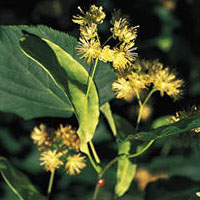Penn Herb Wellness Guide
LindenFind Products
 © Martin Wall
© Martin WallHow It Works
The major active constituents in linden are flavonoids, glycosides, and possibly a volatile oil. One study found that a complex mixture of compounds, primarily flavonoids, reduced anxiety in mice.3 Although used as a traditional herbal remedy for anxiety, these results have not been confirmed in human clinical trials. Older clinical trials have shown that linden flower tea can help people with mild gallbladder problems (but not gallstones), upset stomach or dyspepsia, and excessive gas that causes the stomach to push up and put pressure on the heart (also known as the gastrocardiac syndrome.)4, 5 Linden’s reputed antispasmodic action, particularly in the intestines, has been confirmed in at least one human trial.6
Linden flowers act as a diaphoretic when consumed as a hot tea. Diaphoretics induce a mild fever, thereby possibly helping promote the immune system’s ability to fight infections. The fever usually does not go very high because the diaphoretic also causes sweating, the body’s natural way of lowering its temperature. The German Commission E has approved linden flower for the treatment of colds and cold-related coughs.7
How to Use It
A tea of linden is prepared by adding 23 teaspoons (510 grams) of dried or fresh flowers to a pint (500 ml) of just boiled water. After steeping the flowers in a covered container for ten to fifteen minutes, sip the tea while it is still hot. During an acute problem, several cups can be taken daily for up to one week.8 For longer term use (three to six months), three cups (750 ml) per day can be used. A tincture or fluid extract of linden, 3/41 teaspoon (35 ml) three times daily, may alternatively be used.
Copyright 2026 TraceGains, Inc. All rights reserved.
Learn more about TraceGains, the company.
The information presented by TraceGains is for informational purposes only. It is based on scientific studies (human, animal, or in vitro), clinical experience, or traditional usage as cited in each article. The results reported may not necessarily occur in all individuals. Self-treatment is not recommended for life-threatening conditions that require medical treatment under a doctor's care. For many of the conditions discussed, treatment with prescription or over the counter medication is also available. Consult your doctor, practitioner, and/or pharmacist for any health problem and before using any supplements or before making any changes in prescribed medications. Information expires December 2026.


